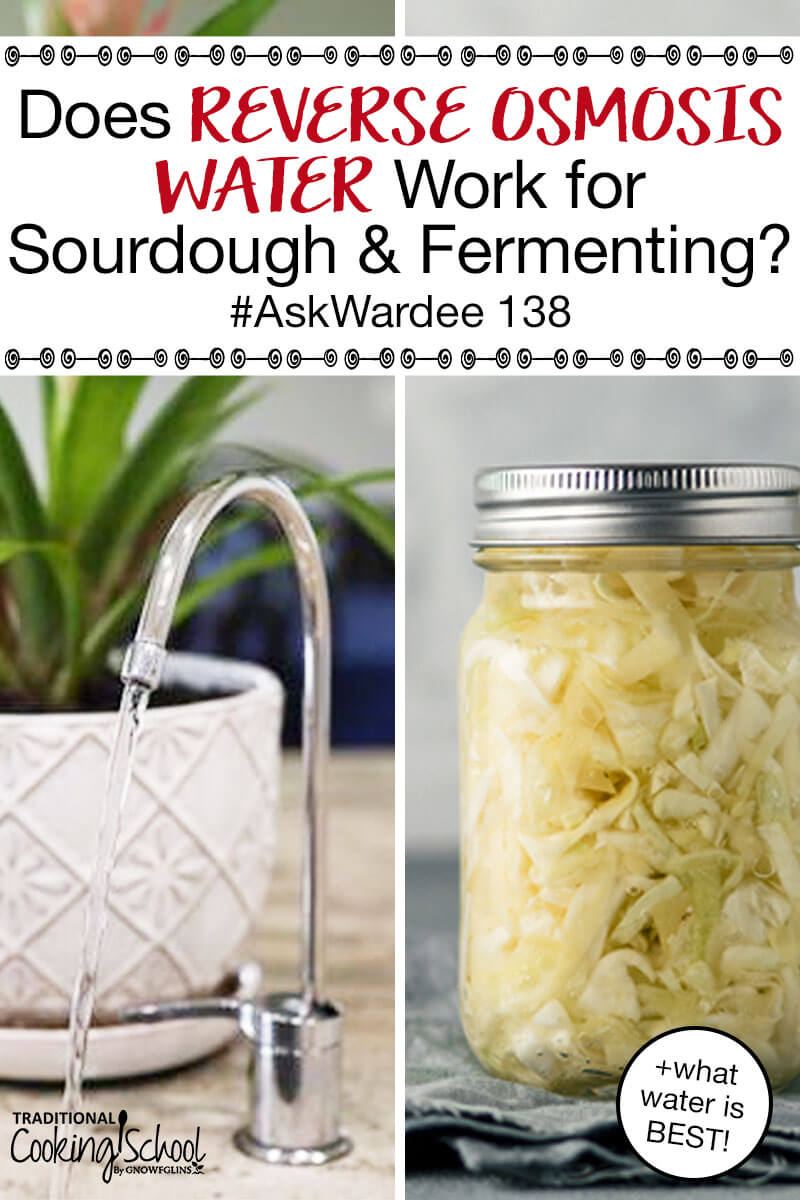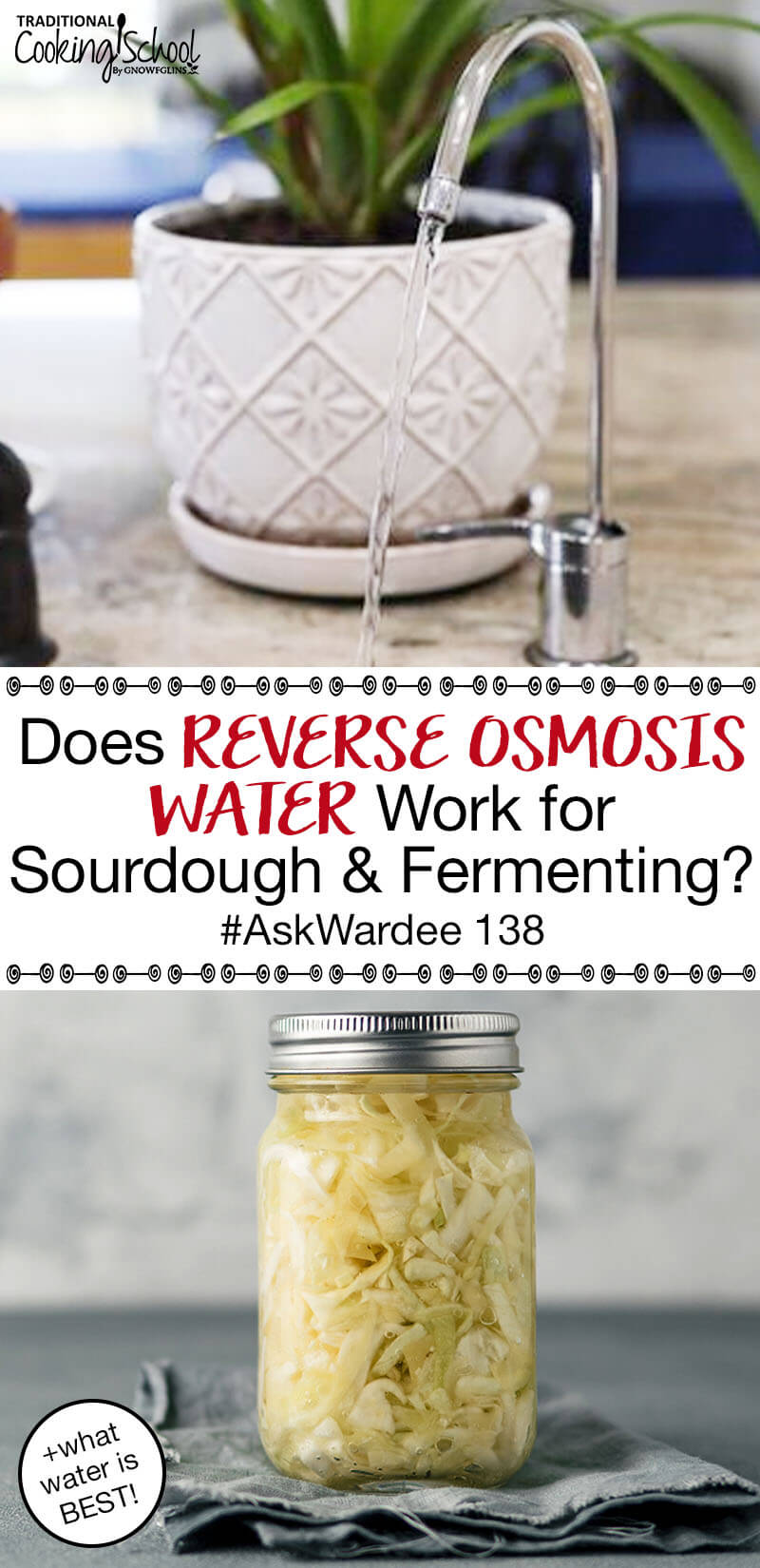
“Can I use reverse osmosis well water for fermenting?” asks Shannon D.
The answer is yes… with a caveat. 🙂
I’m happy to give the short and sweet details on today’s #AskWardee!
Keep reading or watching below to learn more!
Subscribe to #AskWardee on iTunes, Stitcher, YouTube, or the Podcasts app.
Table Of Contents
The Question: Can I Use Reverse Osmosis Water For Fermenting & Sourdough?
Shannon D. asked:
We just moved and no longer have city water. Can I use reverse osmosis well water (we also have an iron filter) to make water kefir and for my sourdough starter? Or do I need to stick with bottled spring water? Thanks!
Shannon, thank you for your question!
Because we’re featuring your question today’s #AskWardee, you’re getting a gift — a FREE eBook and Video Package! Our team will be in contact with you so you can choose which one you’d like!
Can You Use Reverse Osmosis Water For Fermenting & Sourdough?
Yes, you can! There is one caveat, though…
…You Also Need Minerals!
Even though reverse osmosis is one of the most effective ways to purify water, the well-known downside is it removes everything, including minerals.
Minerals are very important to fermenting organisms. Fermentation isn’t successful if minerals aren’t involved… those good guys love minerals!
So that means… once your water is purified via reverse osmosis, you just need to add minerals back into the water!
How To Add Minerals Back To Your Water
If you have Radiant Life’s reverse osmosis water purifier as we do (see it here) it actually adds minerals back to your water after it’s purified.
Psst… you can save $100 on this reverse osmosis water purifier by using coupon code WARDEE at checkout for a limited time!
And not just any minerals! They use a high quality, natural, pure form of coral calcite sourced from the ocean off the coast of Australia. So the water is perfectly pure… and perfectly hydrating!
If your reverse osmosis filter doesn’t remineralize the water as Radiant Life’s does, then simply get some of these mineral drops and put minerals back in your water. Your ferments will thank you. 🙂
Update: We have actually removed the re-mineralization cartridge from our Radiant Life water purifier to avoid adding calcium into our drinking water; we test our body’s calcium levels and have found they are actually too high. We don’t use the mineral drops for the same reason. And actually, our ferments are doing fine.
Which Water Is Best For Fermenting & Sourdough?
The bottom line with fermentation is… clean, uncontaminated water with minerals is the best.
Did you know there are 2,100 known water contaminants? Including chlorine, fluoride, pesticides, herbicides, endocrine disruptors, glyphosate, and nitrates, plus others, they can cause cancer, allergies, hormone imbalances, respiratory issues, and much more.
Our world is more contaminated than ever, so now it’s more important than ever to ensure we’re drinking and bathing in clean, uncontaminated water. And fermenting with clean water, too!
If you have contaminated well or city water, it’s time to explore water filtration options.
You can read about the whole house water filtration systems we chose right here on #AskWardee 134 plus how to go about testing your water to find out what kind of situation you have. (I also discuss non-permanent options in case you’re renting or can’t install a whole house system.)
If filtering isn’t an option, then bottled spring water works.
If you have clean well water, use the water you have. 🙂
More Fermenting Info, Reviews, and Recipes…
Check out my Lacto-Fermentation 101 Free Video Series RIGHT HERE.
And if you haven’t already, CLICK HERE to download our FREE “Fermenting Formulas” Cheat Sheet, where I share formulas so you can create your own safe ferments using the product you have on hand — salsas, relishes, krauts, beverages, and more!
We also have extensive archives of ferment recipes here!
Any Questions Or Comments?
If you have other questions or comments about your own experience with water and fermenting, be sure to leave them in the comments!
Helpful Links
- FREE “Fermenting Formulas” Cheat Sheet
- Lacto-Fermentation 101 Video Series
- Ferment recipes archive
- Which Whole House Water Filtration System We Chose & Why #AskWardee 134
- Radiant Life’s 14-Stage Water Purification System (including reverse osmosis) — get $100 OFF with coupon code WARDEE for a limited time
More Sourdough Posts from the #AskWardee Show:
- How To Make A Sourdough Starter (FAQs, care tips, recipes & more!)
- Does Sourdough Bread Get Moldy? +Troubleshooting Dense Sourdough Bread #AskWardee 110
- When Is A Sourdough Starter Ready For Baking? #AskWardee 145
- The Best & Healthiest Flours For Sourdough #AskWardee 065
- Sourdough Troubleshooting: How To Know When Your Starter Is Strong Enough For Bread-Baking
- Feeding Your Sourdough Starter… More Than Just Flour! #AskWardee 150
- How To Freeze Your Sourdough Starter {Best Way} #AskWardee 059
- Is Aged Flour *Really* Better For Sourdough? #AskWardee 122
- How To Transition A Sourdough Starter To Einkorn #AskWardee 069
What Is The #AskWardee Show?
The #AskWardee Show is the weekly show devoted to answering your niggling questions about Traditional Cooking: whether it’s your sourdough starter, your sauerkraut, preserving foods, broth, superfoods or anything else to do with Traditional Cooking or your GNOWFGLINS lifestyle.
I share tips and resources, plus answer your questions about Traditional Cooking!
The Details
When: Wednesdays at 10am Pacific / 1pm Eastern
Where: Right here at AskWardee.TV or on social media: Traditional Cooking School on Facebook, Traditional Cooking School on YouTube, or @TradCookSchool on IGTV.
Subscribe: Find #AskWardee podcast on iTunes, Stitcher, YouTube, or the Podcasts app. While you’re there, be sure to leave a rating and review!
Want To Get YOUR Question Answered?
Here’s how to submit your question. If we answer it on #AskWardee, you’ll get a gift!
- Tweet your question to @TradCookSchool on Twitter; use hashtag #AskWardee
- Send an email to wardee at AskWardee dot tv — add #AskWardee to your email so I know it’s for the show
Please do NOT add future questions for #AskWardee to the comments of this post because they might get missed!
What type of water do you use for fermenting? Please share your tips in the comments!
We only recommend products and services we wholeheartedly endorse. This post may contain special links through which we earn a small commission if you make a purchase (though your price is the same).



I use distilled water for my ferments, have never added minerals, and have never had problems with it not fermenting healthy batches.
Saving 250ml jars of the ‘juice’ from fermented batches using veggies (salsa, pickles etc) for future batches helps to give them a boost to kick the fermentation process in faster.
I use distilled water for water kefir as well. Adding half of a sterilized egg shell (baked in the oven 270F for 10 minutes), a slice of organic lemon or lime wedge and half and half organic cane sugar and coconut sugar works beautifully, no-fail. 1/2 cup sugar to 1L water.
Spring water can still have glyphosate and other toxins in it since it’s become so ubiquitous, even in the air we breathe now. It doesn’t typically get filtered out prior to purchase.
Are those kombucha jars (3) on the counter behind you?
Hi, Carol.
Yes! Those are Wardee’s continuous brew kombucha jars. 🙂
Here’s our post with more information on them: https://traditionalcookingschool.com/videos/continuous-brew-kombucha-video/
~Danielle, TCS Customer Success Team
Could I add a little Himalayan salt to the water instead of the mineral drops? I usually use it in my drinking water (a knife tip per gallon of water.)
Hi, Rebekah:
I’m happy to help! I’m not certain that just the Himalayan salt would add enough concentrated minerals to accomplish what Wardee is suggesting in this post. Many ferments already include salt (in the form of brine). I’m sure adding Himalayan salt to the water would help — but the mineral drops would probably be more effective. —Sonya, TCS Customer Success Team
How many drops per cup of water should I use? I wonder if this is why my starter isn’t quite as active as it could be. Thank you!
This will depend on the brand of mineral drops, the label should say how much to add to water. 🙂
~Peggy, TCS Customer Success Team
I have the same question. I purchased the minerals linked in this article. It gives a daily dose. Doesn’t talk about how much to use per cup of water.
Hi, Mrs. B. and Marilee: This is what it says on Wardee’s bottle: “Re-mineralize water: Improve the flavor of distilled, reverse osmosis, or purified water. Adding 20-40 drops per gallon or to taste (2-4 drops per glass) compares to expensive mineral water.” I hope that helps! —Sonya, TCS Customer Success Team
We are renting a place with a water softener (the unsoftened water has a nasty smell) and wonder if the salts used in the softening process can cause any problems when fermenting? I usually put the softened water through my BERKEY filter. Thanks for your help.